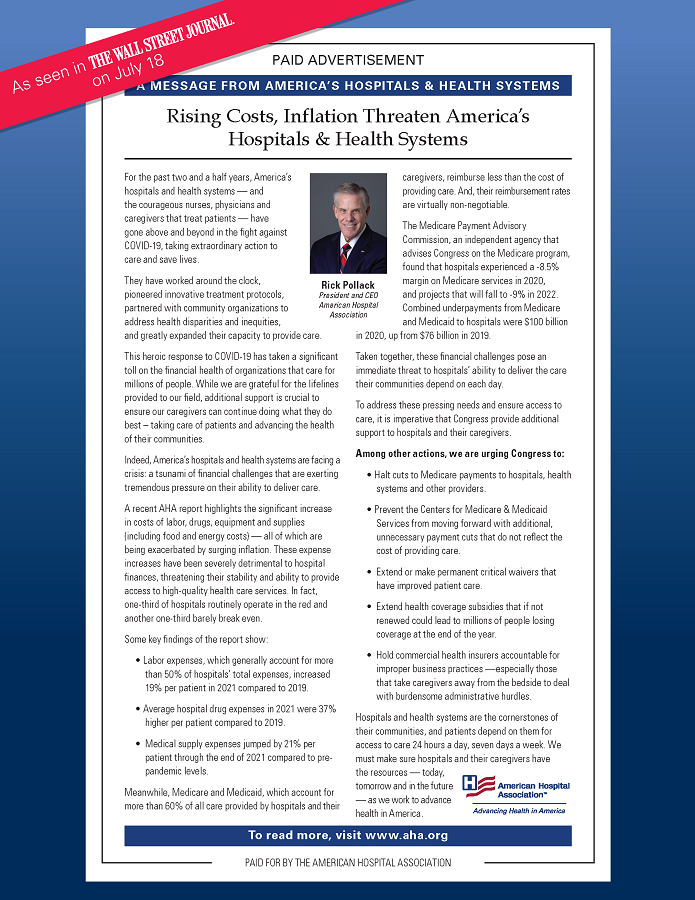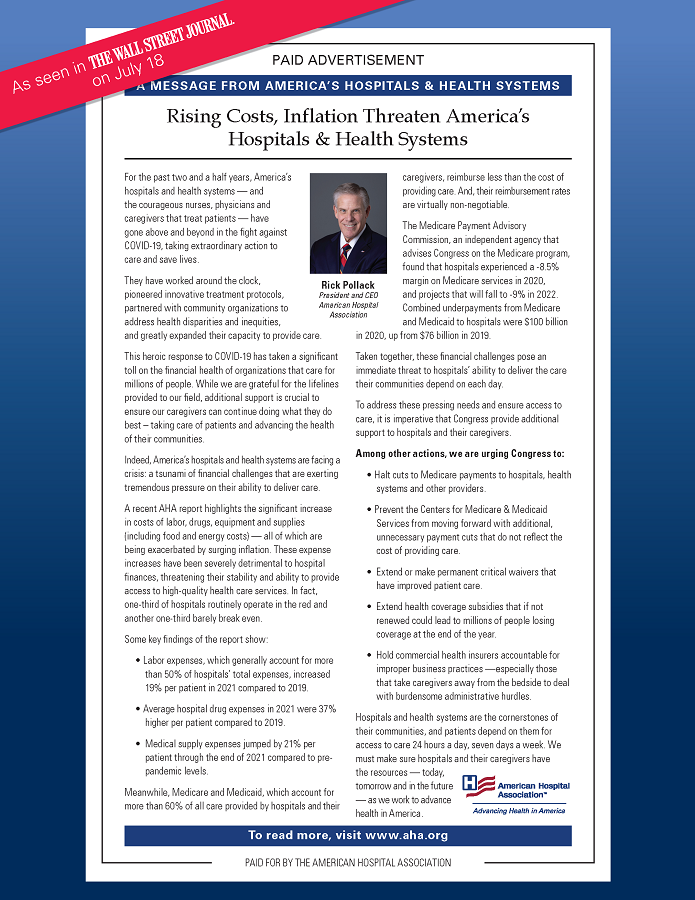

Rising Costs, Inflation Threaten America's Hospitals & Health Systems
A Message from America's Hospitals & Health Systems
As seen in The Wall Street Journal on July 18
For the past two and a half years, America’s hospitals and health systems — and the courageous nurses, physicians and caregivers that treat patients — have gone above and beyond in the fight against COVID-19, taking extraordinary action to care and save lives.
They have worked around the clock, pioneered innovative treatment protocols, partnered with community organizations to address health disparities and inequities, and greatly expanded their capacity to provide care.
This heroic response to COVID-19 has taken a significant toll on the financial health of organizations that care for millions of people. While we are grateful for the lifelines provided to our field, additional support is crucial to ensure our caregivers can continue doing what they do best – taking care of patients and advancing the health of their communities.
Indeed, America’s hospitals and health systems are facing a crisis: a tsunami of financial challenges that are exerting tremendous pressure on their ability to deliver care.
A recent AHA report highlights the significant increase in costs of labor, drugs, equipment and supplies (including food and energy costs) — all of which are being exacerbated by surging inflation. These expense increases have been severely detrimental to hospital finances, threatening their stability and ability to provide access to high-quality health care services. In fact, one-third of hospitals routinely operate in the red and another one-third barely break even.
Some key findings of the report show:
- Labor expenses, which generally account for more than 50% of hospitals’ total expenses, increased 19% per patient in 2021 compared to 2019.
- Average hospital drug expenses in 2021 were 37% higher per patient compared to 2019.
- Medical supply expenses jumped by 21% per patient through the end of 2021 compared to prepandemic levels.
Meanwhile, Medicare and Medicaid, which account for more than 60% of all care provided by hospitals and their caregivers, reimburse less than the cost of providing care. And, their reimbursement rates are virtually non-negotiable.
The Medicare Payment Advisory Commission, an independent agency that advises Congress on the Medicare program, found that hospitals experienced a -8.5% margin on Medicare services in 2020, and projects that will fall to -9% in 2022. Combined underpayments from Medicare and Medicaid to hospitals were $100 billion in 2020, up from $76 billion in 2019.
Taken together, these financial challenges pose an immediate threat to hospitals’ ability to deliver the care their communities depend on each day.
To address these pressing needs and ensure access to care, it is imperative that Congress provide additional support to hospitals and their caregivers.
Among other actions, we are urging Congress to:
- Halt cuts to Medicare payments to hospitals, health systems and other providers.
- Prevent the Centers for Medicare & Medicaid Services from moving forward with additional, unnecessary payment cuts that do not reflect the cost of providing care.
- Extend or make permanent critical waivers that have improved patient care.
- Extend health coverage subsidies that if not renewed could lead to millions of people losing coverage at the end of the year.
- Hold commercial health insurers accountable for improper business practices —especially those that take caregivers away from the bedside to deal with burdensome administrative hurdles.
Hospitals and health systems are the cornerstones of their communities, and patients depend on them for access to care 24 hours a day, seven days a week. We must make sure hospitals and their caregivers have the resources — today, tomorrow and in the future — as we work to advance health in America.
To read more, visit www.aha.org.


